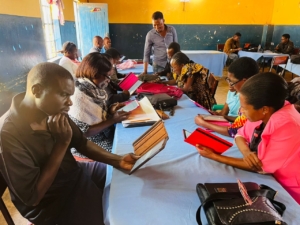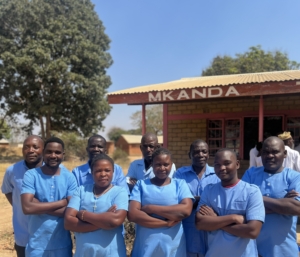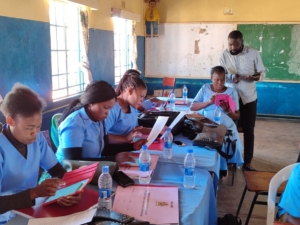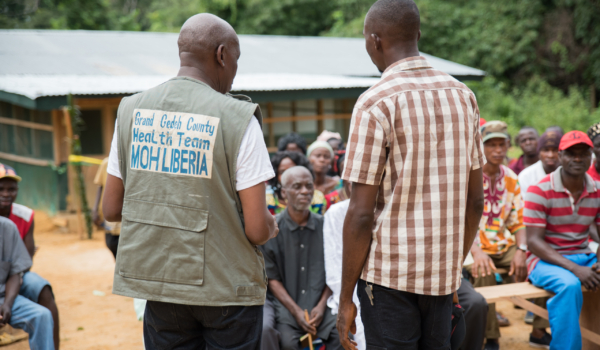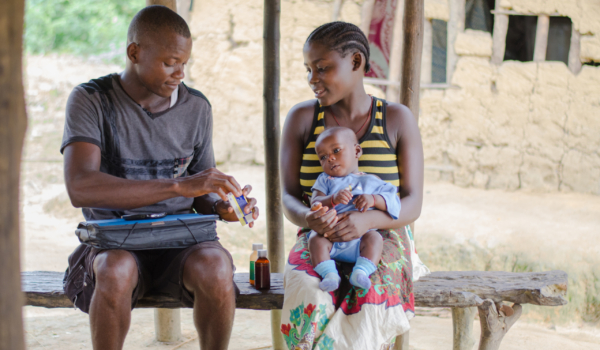For community health workers like Karidi Mumba, the workday is always busy. From seeing patients at the health post to walking long distances to complete home visits across Chaferanthengo Catchment Area, it feels like there are never enough hours in the day. And each week, Karidi has always spent additional hours copying patient data into paper registers—the same data over and over again. “Entering data onto the paper-based registers was an extremely cumbersome task,” Karidi explains.
Across Malawi, community health workers—known nationally as health surveillance assistants—deliver care across large catchment areas, traveling for hours to provide primary healthcare in rural and remote communities. Karidi’s story reflects the reality of many community health workers: high caseloads, busy schedules, and challenges in ensuring patient reports are recorded accurately and shared beyond the community level. To address these challenges, the Ministry of Health partnered with Last Mile Health and the University of Malawi in developing the integrated Community Health Information System (iCHIS), a digital system that supports community health workers in capturing patient data, reporting it to district and national staff, and making decisions at the point of care. Through an application on digital tablets, iCHIS enables users to record key data—such as patient information, population health, and resource availability—track cases, and take action to address individual program needs. The system facilitates efficient, effective reporting for community health workers, as well as an accurate, timely look into community-level health data for district- and national-level health officials.
“Last Mile Health aims to strengthen Malawi’s health system by equipping community health workers with the systems they need to do their work successfully, using data systems to enable decision-making at the point of care through iCHIS as well as ensuring that appropriate policies and strategies are in place,” explains Dalitso Baloyi, Last Mile Health’s Malawi Country Director. “Overall, this work should culminate in a community health system that is responsive to the country’s needs.”
Since the development and launch of iCHIS in 2022, the Ministry and Last Mile Health have begun training community health workers across Malawi in the system. During the week-long course, community health workers practice using iCHIS in simulated real-world scenarios—and then apply the training in field visits. They input patient data, record treatments, and generate reports. For learners who have less experience with tablets and digital apps, training also familiarizes them with the tools they’ll use and builds their confidence with technology. As of October 2023, 1,740 community health workers across 9 districts have been trained to use iCHIS — representing 14.5% of Malawi’s community health workforce.
Implementing the system is a key component in the Government of Malawi’s commitment to establishing a cohesive health system—and enhancing primary healthcare access and quality across the country. “We are very excited with the coming of iCHIS in our district,” says Robson Kayira, Mchinji’s District Environmental Health Officer and the overall supervisor for community health in the district. “We have already seen how this system will simplify the work of our community health workers as well as help us, as their managers, access community health data easily.”
Mchinji is the ninth district to begin using iCHIS, but the scaling of the system has only just begun. Looking ahead, Last Mile Health will continue to partner with the Ministry of Health to implement iCHIS in additional districts—and will simultaneously continue to partner with the Ministry of Health in developing advocacy strategies for robust, sustainable community health financing. Strong financing will support quality training and integration into the national health systems for community health workers—and increased access to the tools they need to work effectively and efficiently at their full potential.
For community health workers like Karidi, the impact of iCHIS is already tangible. “With iCHIS and the power of its software, it is now so easy to input data,” she explains. “I am also extremely happy that the data is also easily retrievable, as I am responsible for 2,008 people in my catchment area.”
For patients across Mchinji District and beyond, a stronger system means better access to quality primary care: the care all patients need and deserve.

